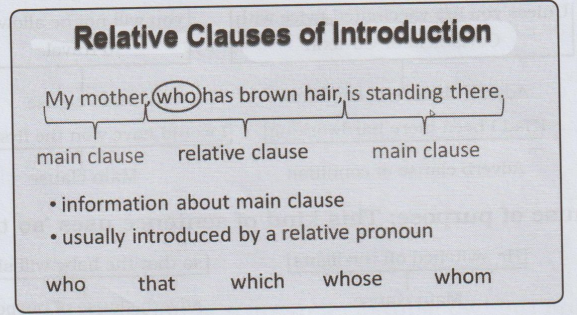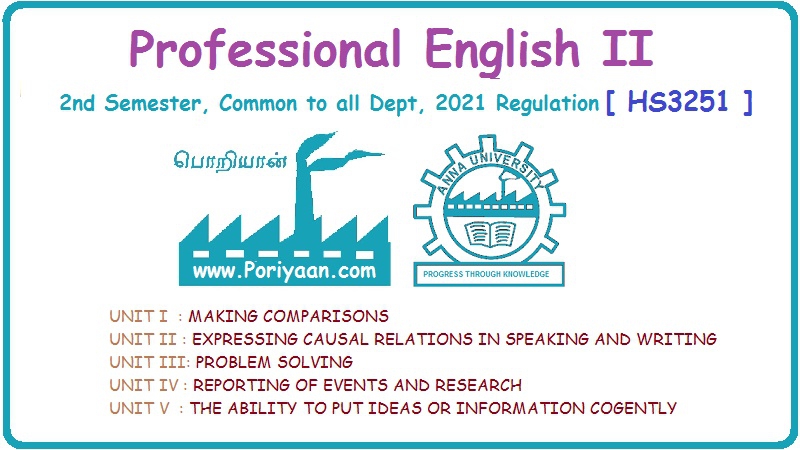Professional English: Grammar: UNIT 5
Relative Clauses
Grammar
A group of words which is a part of a sentence and which has a Subject and a Predicate is known as clause.
CHAPTER - 18
RELATIVE CLAUSES
A
group of words which is a part of a sentence and which has a Subject and a
Predicate is known as clause.
A
clause is related to the main clause and so it is called a relative clause.
Relative
clauses are of many types
i.
Adverb clause
ii.
Adjective clause
iii.
Noun clause
All
the above clauses make a complex sentence.
Adverb
clause has many types
Adverb
clause of place uses 'where' and 'wherever'.
Eg.
You may take rest in the place wherever you feel comfortable.
You
may take rest in the place → Main clause
wherever
you feel comfortable. → relative clause or subordinate clause
Eg.
This is the place where I used to sit and study in my college.
This
is the place → Main clause
where
I used to sit and study in my college. → adverb clause of place
or relative clause
Adverb
clause of time:
This
kind of clause uses when, while, until, till, before, after etc.
Eg.
When I was a ten old girl →Subordinate clause or adverb clause of time or relative
clause
I
thought empty spelt MT. → main clause
Eg.
Make hay → Main clause
while
the sun shines. → subordinate clause or relative clause or adverb clause of
time
Eg.
He has to take rest → Main clause
until
he recovers fully well. → adverb clause of time ores relative clause or
subordinate clause
Eg.
Will
you be able to wait → Main clause
till
I return? → adverb clause of time or subordinate clause or relative clause
Eg.
Look
→ Main clause
before
you leap. → adverb clause of time or relative clause or subordinate clause
Eg.
After he had entered the hall → Adverb clause of time
he
saw his classmate. → main clause
Adverb
clause of manners:
It
answers the question 'how'.
Eg.
He
behaves → main clause
other
expect him to behave. → adverb clause of manner.
Adverb
clause of reason:
This
kind of clause uses 'since', 'because', 'for' etc.
Eg.
He
forgave his friend → Main clause
since
he repented for his mistake. → adverb clause of reason
Eg.
I
accompanied her → Main clause
because
she was going alone. → adverb clause of reason
Eg.
The
daughter paid money → Main clause
for
mother's debit card is hotlisted. → adverb clause of reason
Adverb
clause of condition:
It
uses 'if', 'unless' 'had'
Eg.
This is the place where I used to sit and study in my college.
If
you save money → Main clause
you
need not earn after 50 and you can follow your passion. → adverb
clause of place or relative clause
Eg.
Unless
you are vaccinated twice with Covishield or Covaxin → Adverb clause of
condition
you
will not be allowed to travel. → Main clause
Eg.
Had
I been more hardworking → Adverb clause of condition
I
would have won the first prize. → Main clause
Adverb
clause of purpose: This kind of sentence uses 'so that'
Eg.
He
switched off the lights → Main clause
so
that the baby will sleep → adverb clause of purpose.
Adjective
Clause
Adjective
clause does the work of an adjective. It uses 'that' or 'who'

Noun
Clause:
It
answers the question 'what'. It uses 'that'
Eg.
He
said → Main clause
that
his betrothal was over. → noun clause or subordinate clause or relative clause.
He
said 'what'
He
said his betrothal was over.
Eg.
I
expect → Main clause
that
I will become the topper. → subordinate or relative clause or noun clause.
SPLIT
CLAUSES:
If
the subordinate clause is inside the main clause, it becomes a split clause.
Eg.
The man who is kind is always reciprocated.

Professional English: Grammar: UNIT 5 : Tag: : Grammar - Relative Clauses
Related Topics
Related Subjects
Professional English II
HS3251 2nd Semester 2021 Regulation | 2nd Semester Common to all Dept 2021 Regulation
